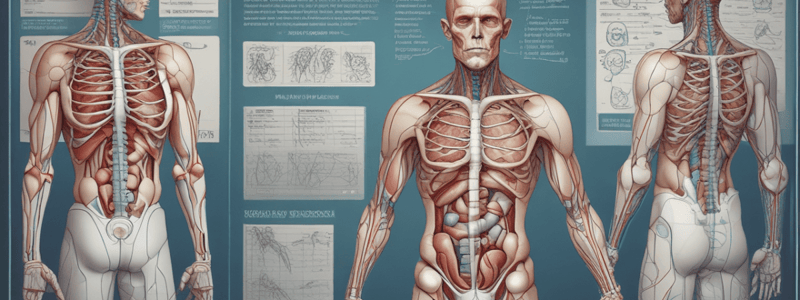Podcast
Questions and Answers
What does the suffix '-itis' mean in a medical terminology context?
What does the suffix '-itis' mean in a medical terminology context?
- Swelling
- Inflammation (correct)
- Tumor
- Pain
What does the prefix 'hemo-' mean in a medical terminology context?
What does the prefix 'hemo-' mean in a medical terminology context?
- Brain
- Muscle
- Bone
- Blood (correct)
What is the medical abbreviation for 'electrocardiogram'?
What is the medical abbreviation for 'electrocardiogram'?
- EMG
- EEG
- EKG (correct)
- ECG (correct)
Which medical specialty deals with the diagnosis and treatment of disorders of the nervous system?
Which medical specialty deals with the diagnosis and treatment of disorders of the nervous system?
What is the anatomical term for the upper arm bone?
What is the anatomical term for the upper arm bone?
What is the primary function of a medical root word?
What is the primary function of a medical root word?
What is the purpose of a medical prefix?
What is the purpose of a medical prefix?
Which medical specialty focuses on the diagnosis and treatment of skin disorders?
Which medical specialty focuses on the diagnosis and treatment of skin disorders?
What is the anatomical term for the study of the structure and organization of living things?
What is the anatomical term for the study of the structure and organization of living things?
What is the purpose of using medical abbreviations?
What is the purpose of using medical abbreviations?
What is the primary function of a medical suffix?
What is the primary function of a medical suffix?
Which of the following medical specialties deals with the diagnosis and treatment of disorders of the musculoskeletal system?
Which of the following medical specialties deals with the diagnosis and treatment of disorders of the musculoskeletal system?
What is the anatomical term for the study of the structure and function of the kidneys?
What is the anatomical term for the study of the structure and function of the kidneys?
Which of the following medical abbreviations represents the term 'magnetic resonance imaging'?
Which of the following medical abbreviations represents the term 'magnetic resonance imaging'?
What does the medical root word 'cardi-' mean?
What does the medical root word 'cardi-' mean?
What is the primary function of a medical root word?
What is the primary function of a medical root word?
Which medical specialty deals with the diagnosis and treatment of disorders of the heart?
Which medical specialty deals with the diagnosis and treatment of disorders of the heart?
What is the purpose of using medical abbreviations?
What is the purpose of using medical abbreviations?
What is the anatomical term for the study of the structure and function of the liver?
What is the anatomical term for the study of the structure and function of the liver?
What is the function of a medical prefix?
What is the function of a medical prefix?
Flashcards are hidden until you start studying
Study Notes
Medical Terminology Basics
- Medical root words are the core of medical terms, providing the main meaning of the word.
- Suffixes in medical terminology are added to the end of a root word to modify or enhance its meaning, often indicating a condition, disease, or procedure.
Understanding Suffixes
- -itis suffix indicates inflammation, such as in arthritis (inflammation of the joints).
- -oma suffix indicates a tumor, such as in carcinoma (a type of cancer).
- -algia suffix indicates pain, such as in neuralgia (nerve pain).
Understanding Prefixes
- Anti- prefix indicates against or opposite, such as in antibiotic (against bacteria).
- Re- prefix indicates again or back, such as in rejuvenate (to make young again).
- Hyper- prefix indicates excessive or above, such as in hypertension (high blood pressure).
Medical Abbreviations
- Common medical abbreviations include BP (blood pressure), HR (heart rate), and Rx (prescription).
Communication in Medical Terms
- Effective communication using medical terms requires a clear understanding of medical terminology to convey accurate information.
Medical Specialties
- Different medical specialties include cardiology (heart), neurology (brain and nervous system), and oncology (cancer).
- Each specialty has its own set of terminology and focus area.
Anatomical Terminology
- Anatomical terminology is used to describe body parts and functions, such as the cranium (skull), femur (thigh bone), and vasculature (blood vessels).
- Understanding anatomical terminology is essential for accurate communication in medical contexts.
Medical Terminology Basics
- Medical root words are the core of medical terms, providing the main meaning of the word.
- Suffixes in medical terminology are added to the end of a root word to modify or enhance its meaning, often indicating a condition, disease, or procedure.
Understanding Suffixes
- -itis suffix indicates inflammation, such as in arthritis (inflammation of the joints).
- -oma suffix indicates a tumor, such as in carcinoma (a type of cancer).
- -algia suffix indicates pain, such as in neuralgia (nerve pain).
Understanding Prefixes
- Anti- prefix indicates against or opposite, such as in antibiotic (against bacteria).
- Re- prefix indicates again or back, such as in rejuvenate (to make young again).
- Hyper- prefix indicates excessive or above, such as in hypertension (high blood pressure).
Medical Abbreviations
- Common medical abbreviations include BP (blood pressure), HR (heart rate), and Rx (prescription).
Communication in Medical Terms
- Effective communication using medical terms requires a clear understanding of medical terminology to convey accurate information.
Medical Specialties
- Different medical specialties include cardiology (heart), neurology (brain and nervous system), and oncology (cancer).
- Each specialty has its own set of terminology and focus area.
Anatomical Terminology
- Anatomical terminology is used to describe body parts and functions, such as the cranium (skull), femur (thigh bone), and vasculature (blood vessels).
- Understanding anatomical terminology is essential for accurate communication in medical contexts.
Medical Terminology Basics
- Medical root words are the core of medical terms, providing the main meaning of the word.
- Suffixes in medical terminology are added to the end of a root word to modify or enhance its meaning, often indicating a condition, disease, or procedure.
Understanding Suffixes
- -itis suffix indicates inflammation, such as in arthritis (inflammation of the joints).
- -oma suffix indicates a tumor, such as in carcinoma (a type of cancer).
- -algia suffix indicates pain, such as in neuralgia (nerve pain).
Understanding Prefixes
- Anti- prefix indicates against or opposite, such as in antibiotic (against bacteria).
- Re- prefix indicates again or back, such as in rejuvenate (to make young again).
- Hyper- prefix indicates excessive or above, such as in hypertension (high blood pressure).
Medical Abbreviations
- Common medical abbreviations include BP (blood pressure), HR (heart rate), and Rx (prescription).
Communication in Medical Terms
- Effective communication using medical terms requires a clear understanding of medical terminology to convey accurate information.
Medical Specialties
- Different medical specialties include cardiology (heart), neurology (brain and nervous system), and oncology (cancer).
- Each specialty has its own set of terminology and focus area.
Anatomical Terminology
- Anatomical terminology is used to describe body parts and functions, such as the cranium (skull), femur (thigh bone), and vasculature (blood vessels).
- Understanding anatomical terminology is essential for accurate communication in medical contexts.
Medical Terminology Basics
- Medical root words are the core of medical terms, providing the main meaning of the word.
- Suffixes in medical terminology are added to the end of a root word to modify or enhance its meaning, often indicating a condition, disease, or procedure.
Understanding Suffixes
- -itis suffix indicates inflammation, such as in arthritis (inflammation of the joints).
- -oma suffix indicates a tumor, such as in carcinoma (a type of cancer).
- -algia suffix indicates pain, such as in neuralgia (nerve pain).
Understanding Prefixes
- Anti- prefix indicates against or opposite, such as in antibiotic (against bacteria).
- Re- prefix indicates again or back, such as in rejuvenate (to make young again).
- Hyper- prefix indicates excessive or above, such as in hypertension (high blood pressure).
Medical Abbreviations
- Common medical abbreviations include BP (blood pressure), HR (heart rate), and Rx (prescription).
Communication in Medical Terms
- Effective communication using medical terms requires a clear understanding of medical terminology to convey accurate information.
Medical Specialties
- Different medical specialties include cardiology (heart), neurology (brain and nervous system), and oncology (cancer).
- Each specialty has its own set of terminology and focus area.
Anatomical Terminology
- Anatomical terminology is used to describe body parts and functions, such as the cranium (skull), femur (thigh bone), and vasculature (blood vessels).
- Understanding anatomical terminology is essential for accurate communication in medical contexts.
Studying That Suits You
Use AI to generate personalized quizzes and flashcards to suit your learning preferences.




